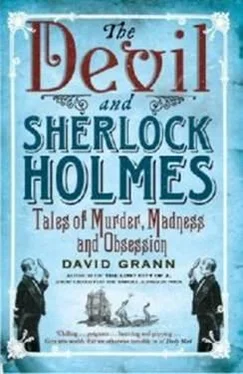Now he looked as if he hadn’t slept for days. “Hawks are circling, buzzards circling, sharks circling… trying to kill the Traficant election,” he stammered. He paused, his cheeks reddening. “Let me tell you what: Twenty years ago-not quite-I was the only American in the history of the United States to defeat the Justice Department… They have targeted me ever since.” Pointing his finger into the camera, he continued, “I’m targeting them. They better not make a damn mistake… I am mad and… I’m going to fight like a junkyard dog in the face of a hurricane, and… if I beat them you’re now watching one of the richest men in America, because I’m going to sue their assets all apart.”
Even stranger than his warnings to the Justice Department and the F.B.I.-and his admonition that he would shoot any unexpected late-night visitors to his house-were Traficant’s threats to his own party. He warned that if Democratic leaders didn’t stand by him he would switch parties. And, as further compensation for his loyalty, Traficant demanded a list of favors for his district: “I want an empowerment zone from the President of the United States-and I expect it this year-and I want additional appropriations.” On national television, he seemed to be extorting not only members of Congress but also the United States President.
His threats came after authorities had already convicted several people connected to him. Among them were O’Nesti, his top aide and Strollo’s bagman; a disbarred attorney who had once advised Traficant, and who was implicated in the scheme to murder the prosecutor Paul Gains; and two former deputy sheriffs who had served in Traficant’s sheriff’s office, and who were convicted of taking bribes from the Mob. According to accounts first detailed in the Vindicator and the Cleveland Plain Dealer, investigators were looking into, among other things, whether the Congressman received illegal contributions-including the use of a Corvette-from associates in the valley. Authorities had homed in on two brothers, Robert T. and Anthony R. Bucci, who owned a paving company in Traficant’s district and allegedly delivered materials and did construction work on the Congressman’s seventy-six-acre farm. Both brothers appeared to be enmeshed in the city’s network of corruption. On one of the F.B.I.’s wiretaps, O’Nesti could be heard conspiring with Strollo to steer a million-dollar contract to the Buccis’ company. Robert Bucci had since fled the country after allegedly transferring millions of dollars to an offshore account in the Cayman Islands.
Throughout the investigation, Traficant had steadfastly maintained his innocence, and the valley was bracing for a second epic trial. “Here’s what I’m saying now,” he insisted on C-SPAN, “and I’m saying this to the Justice Department… If you are to indict me, indict me in June so I can be tried over the August recess. I don’t want to miss any votes.”
Not long after, I travelled to Youngstown, hoping to learn more about the case against the Congressman and the Mafia’s hold on the region. Though it was the middle of the day, the downtown area was eerily empty. Rows of stores were boarded up, and the ornate façades of buildings were crumbling. Finally, I saw a light in a clothing store, where an old man was folding Italian suits. When I went in and asked him about the Congressman, he said, “Ain’t no one gonna get rid of Traficant. Traficant’s too sharp.” He recalled fondly the “henchmen,” including Strollo, who bought hand-tailored clothes from him. “They didn’t wear red or pink suits like they’re coming out with now,” he said. When I pressed him about the local corruption, he shrugged. “Who cares? If you’re working and making a living and nobody is bothering you, why are you going to butt in?”
That night at the restaurant in my hotel, several Youngstown natives who were in their seventies and eighties were sitting around a table arguing about the Congressman. “Traficant produces,” one of the men said. “That’s what counts.”
“Damn right!” another said.
A frail man with white hair said, “When I was eight years old I delivered newspapers downtown, and I would always go by this speakeasy on Sunday afternoon. Well, one day the owner says, ‘I want you to meet someone.’ So I went over and it was Al Capone.” He paused, then repeated, “Al Capone.”
Another man at the table, who had remained silent, suddenly said, “You see this? This is typical Youngstown. Here’s an educated man, an attorney, and Traficant is a god of his, and he’s still raving about meeting Al Capone.”
Later, Mark Shutes, an anthropologist at Youngstown State University who had studied the region, told me, “We have socialized ourselves and our offspring that this is the way the world is… There is no sense in this community in which gangsters are people who have imposed their will on our community. Their values are our values.”
During the latest Democratic primary for Congress, Traficant faced two opponents who railed against his alleged Mob ties and noted that he would soon be indicted. Still, Traficant won the primary with more votes than his two main competitors combined. Traficant seemed invulnerable; some congressional Republicans had even begun to defend him, apparently hoping he’d follow through on his threat to switch parties. “Jimmy Traficant is not being done right by,” Representative Steve LaTourette, Republican of Ohio, told the Cleveland Plain Dealer. “There isn’t a finer man, there isn’t a finer member of Congress, there isn’t a finer human being.”
Emboldened by his popular support, Traficant attempted to do what he always did: rally the valley against the outsiders he claimed were trying to besmirch its name. Over the last year, he has defiantly called his convicted former top aide, O’Nesti, a “good friend” and championed a local sheriff convicted of racketeering, arguing that he should be moved to a prison closer to Youngstown to be near his ill mother. Traficant said of members of the F.B.I., “These sons of bachelors will not intimidate me, and they won’t jack me around.”
Though he refused to talk to me or to other reporters (“I’ll only make an official statement when I’m actually killed,” he said), he and his staff released a torrent of press releases attacking those pursuing him. “TRAFICANT BILL WOULD CREATE NEW AGENCY TO INVESTIGATE JUSTICE DEPARTMENT,” one release said. Another said, “TRAFICANT WANTS PRESIDENT TO INVESTIGATE FEDERAL AGENTS IN YOUNGSTOWN.” On the House floor, where his speech was protected against suits for libel, he was even bolder. “Mr. Speaker, I have evidence that certain F.B.I. agents in Youngstown, Ohio, have violated the RICO STATUTE and… stole large sums of cash,” he claimed. “What is even worse, they ‘suggested’ to one of their field operative informants that he should commit murder. Mr. Speaker, murder.”
Before I left Youngstown, I stopped by the F.B.I. office in Boardman, Ohio, where Kroner and his boss, Andy Arena, were trying to fend off Traficant’s allegations. They were careful not to say anything about the pending investigation of the Congressman, but it was clear they were under siege. On talk radio, Traficant supporters denounced Kroner as a thief, a con man, a crook, a creep, a liar, and a dope dealer. “The thing that most depressed me,” Kroner told me, “was when I became the subject on talk radio one day and they were discussing my integrity.” He folded his arms. “I just have to block out [those] things.” Rather than a hero, he had become almost a pariah. “Everything is turned upside down here,” Arena said.
As Kroner sat in his neatly pressed jacket and loafers, with his twenty-year-anniversary F.B.I. medallion mounted prominently on a thick gold ring, he seemed slightly defensive. “Every time we charge another public official, the [media] presents it as another black eye for the community,” he said. “I’d prefer if they’d portray it to the community as another step in cleansing ourselves. We’ve got to take a look at what’s being done here as a positive thing.”
Читать дальше











